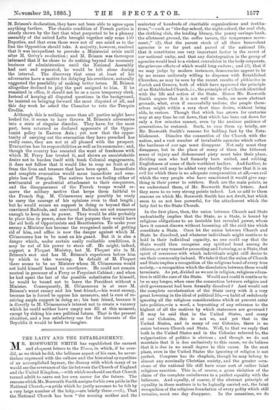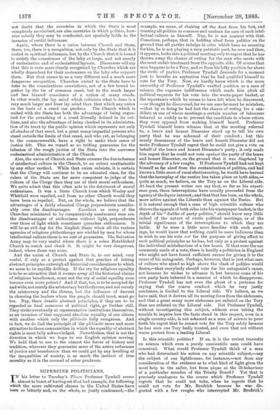THE LAITY AND THE ESTABLISHMENT.
MR. BOSWORTH SMITH has republished the earnest and eloquent letters to the Times, in which, if he over- did, as we think he did, the bellicose aspect of his case, he never- theless expressed with the culture and the historical sympathies of an accomplished layman, the dismay with which many of na would see the severance of the tie between the Church of England and the United Kingdom,—with which we should see that Church turned adrift to carve out her own career for the future. The reasons which Mr. Bosworth Smith assigns forhis own pride in the National Church,—a pride which he justly assumes to be felt by a very large number of the laity,—are briefly these :—(1), That the National Church has been " the nursing mother and the mainstay of hundreds of charitable organisations and institu- tions,"—such as "the day-school, the night-school, the coal club, the clothing club, the lending library, the penny savings-bank, the allotment ground, the coffee tavern, the temperance move- ment;" (2), that the parent stock of all these benevolent agencies is so far part and parcel of the national life, that it constitutes one very important factor in the secret of our national unity, and that any disintegration in the group of agencies would lead to a violent convulsion in the body corporate, the grievous effects of which would long endure ; and (3), that if we may judge by modern instances, democracies appear to be by no means uniformly willing to dispense with Established Churches, as may be seen by the recent results of plebiscites in Zurich and Geneva, both of which have approved the principle of an Established Church, i.e., the principle of a Church identified with the life and action of the State. Hence Mr. Bosworth Smith argues that it is not well to undo, on mere abstract grounds, what, even if successfully undone, the people them- selves might within a very short time desire, without being able, to restore. Though that which has grown for centuries may at any time be cut down, that which has been cut down for only a few minutes cannot, even by the anxious patience of generations, be restored. Such, to sum them up briefly, are Mr. Bosworth Smith's reasons for holding fast by the Esta- blishment. Dissolve the connection of the Church with the nation, and a vast number of invaluable agencies which soften the hardness of oar age must disappear. Not only must they disappear, but in the place of many of them the bitterest sense of injury and dishonoured piety must take their place, dividing men who had formerly been united, and robbing Englishmen of some of their worthiest leaders. And further, to this great evil may be added very shortly the sense that it is an evil for which there is no adequate compensation at all,—an evil which the very people who have sanctioned it would give any-
thing in their power to retrieve. Such are the main points, as we understand them, of Mr. Bosworth Smith's letters. And they seem to us very strong points indeed. Let us add to them reasons on which Mr. Bosworth Smith has not dwelt, but which seem to us not less powerful, for the attachment which the laity feel to the State Church.
In the first place, then, the union between Church and State undoubtedly implies that the State, as a State, is bound by religions obligations to an invisible but revealed power, whose laws it cannot disown without loosening all the civil ties which constitute a State. Once let the union between Church and State be dissolved, and whatever individuals might continue to hold in their individual capacity, no one could say that the State would then recognise any spiritual bond among its citizens, or any reasonfor promoting and fostering, as a State, that spirit of reverence with which individuals might still desire to see their community imbued. We take it that the union of Church and State implies a recognition of the religions bond of every true society,--a recognition which the dissolution between them would terminate. As yet, divided as we are in religion, religious educa- tion is still the care of the State. Would and could it continue to be so any longer, when once the connection between religion and civil government had been formally dissolved P And would not the complete secularisation of the State carry with it a very great lowering in the ideal of political life,—a habit of sedulously ignoring all the religious considerations which at present enter into politics,—in a word, a boycotting of any reference to the highest of all the motives by which statesmen are governed P A may be said that in the United States, and many of our Colonies, this is not so, and yet that in the United States, and in many of our Colonies, there is no union between Church and State. Well, to that we reply that both in the United States and in the Colonies referred to, the vulgarisation of politics is obvious ; and though we do not maintain that it is due exclusively to this cause, we do believe that it is due in no small degree to this cause. In the next place, even in the United States the ignoring of religion is not perfect. Congress has its chaplain, though he may belong to almost any nominally Christian society, and the greater occa- sions of the national life still have some sort of rather faint religious sanction. This is, of course, a gross violation of the claim of the complete unbelievers to a perfect equality with the believers. And equally, of course, if the abstract principle of equality in these matters is to be logically carried out, the faint recognition of the religions foundation of every polity which still remains, must one day disappear. In the meantime, we do
not doubt that the countries in which the State is most completely secularised, are also countries in which politics, how- ever soberly they may be conducted, are specially liable to the invasion of sordid influences.
Again, where there is a union between Church and State, there, too, there is a recognition, not only by the State that it is rooted in spiritual influences, but by the Church that it is bound to satisfy the consciences of the laity at large, and not merely of ecclesiastics and of ecclesiastical laymen. Dissenters will say that this is even more clearly recognised by Churches which are wholly dependent for their sustenance on the laity who support them. But that seems to us a very different and a much more dangerous recognition. Churches united to the State have to
defer to the conscientious convictions, not of a few bound to- gether by the tie of common creed, but to the much larger and less biassed conscience of a nation of many creeds. In other words, the lay mind which criticises what is done is a very much larger and freer lay mind than that which any union on the basis of a creed can produce. The Church which is united with the State has both the advantage of being organ- ised for the preaching of a creed liberally defined in its out- lines, and also the advantage of being checked in its administra- tion of its trust by the public opinion which represents not only all shades of that creed, but a great many impartial pers- ons who stand outside the limits of that creed, and who yet, as belonging to the commonwealth, have a right to make their sense of justice felt. This we regard as no trifling guarantee for the infusion of the rough justice of the State into the narrower ecclesiastical administration of the Church.
Also, the union of Church and State ensures the due influence of intellectual culture in the Church, to an extent unattainable by any other method. While that union subsists, it is certain that the Clergy will continue to be an educated class, for the rulers of the State are far more competent to judge of the culture of the Clergy than they are of their moral enthusiasm. We quite admit that this often acts to the detriment of moral enthusiasm. It was a State Church from which Wesley and Whitfield were repelled, and from no other Church would they have been so repelled. Bat, on the whole, we believe that the advantages of a fairly educated Clergy preponderate consider- ably over the disadvantages. Excellent as many of the Churches ministered to by comparatively uneducated men are, the disadvantages of enthusiasm without light, preponderate over those of light which sometimes quenches enthusiasm. It will be an evil day for the English State when all the various agencies of religious philanthropy are wielded by men for whose intellectual culture there is no sort of guarantee. The Salvation Army may be very useful where there is a sober Established Church to watch and check it. It might be very dangerous, indeed, where there was none.
And the union of Church and State is, to our mind, very useful, if only as a protest against that practice of letting abstract principles outweigh all historical considerations to which we seem to be rapidly drifting. If the ery for religious equality is to be so attractive that it sweeps away all the historical claims of religious beneficence, must not the cry of social equality soon become even more potent P And if that, too, is to be accepted far and wide, not merely the aristocracy but the throne, and not merely the aristocracy and the throne, but the influence of descent in choosing the leaders whom the people should trust, must go too. Nay, these drastic abstract principles, if they are to be regarded as firma measures of political right, go farther still. They strike eventually at representative institutions themselves, as an invasion of that supposed absolute equality of one citizen with another which only the plebiscite fully recognises. And in fact, we do find the principle of the plebiscite more and more attractive to those communities in which the equality of abstract rights is most fully acknowledged. Nevertheless, that is not the direction in which we hope to see English opinion moving. We hold that to use to the utmost the forces of history and tradition, wherever they guarantee more of the active influences of justice and beneficence than we could get by any levelling of the inequalities of society, is as much the instinct of true morality as it is the counsel of sober prudence.



































 Previous page
Previous page